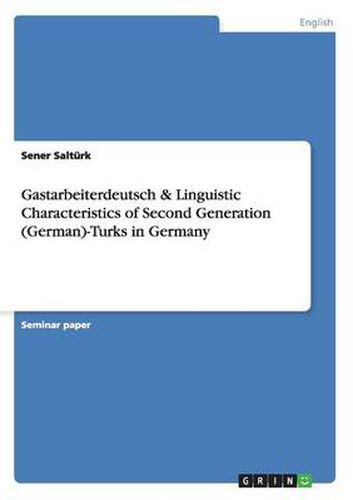Readings Newsletter
Become a Readings Member to make your shopping experience even easier.
Sign in or sign up for free!
You’re not far away from qualifying for FREE standard shipping within Australia
You’ve qualified for FREE standard shipping within Australia
The cart is loading…






Seminar paper from the year 2006 in the subject English Language and Literature Studies - Linguistics, grade: 1,3, University of Duisburg-Essen (Anglistisches Institut), course: Pidgins & Creoles, language: English, abstract: […] Their children, the (so-called) second generation who were mostly born in Germany had a not so fundamentally different relationship to Germany which is actually supposed to be their home country. There are, however, some vast differences between these generations, especially in terms of their German language proficiency. Most of the second (or third/fourth) generation of Gastarbeiter today are bilingual speakers, generally more fluent in German than in the respective language of their parents. Of course, these generations share more distinctive features than sole linguistic ones: the majority of the guest workers’ children are, in full contrast to their parents, in many ways integrated into German society and do have a much closer relationship to Germany as a whole. Whereas most Germans are monolingual, speaking some (more or less acceptable) English or French or Italian etc., the Germans (!) with foreign descent have two languages at their disposal - whether they succeed in both languages (or in either of them!) is, of course, another question, many of which, however, can be tackled using a socio-linguistic approach. For the purpose of this paper I shall focus on some linguistic phenomena of Gastarbeiterdeutsch, not only referring to the (highly restricted) German language proficiency of the first generation of Turkish guest workers (circa 1960-1975) but also on their offspring (circa 1975-). Since I am of Turkish descent myself -my father, a guest worker himself, had his first shift in a German coal-mine in August 1965- I have been (and still am) dealing very closely with the language-related particularities (and oddities) of a Turkish dominated parents’ house somewhere in North Rhine-Westphalia. In order to explain these, to
$9.00 standard shipping within Australia
FREE standard shipping within Australia for orders over $100.00
Express & International shipping calculated at checkout
Stock availability can be subject to change without notice. We recommend calling the shop or contacting our online team to check availability of low stock items. Please see our Shopping Online page for more details.
Seminar paper from the year 2006 in the subject English Language and Literature Studies - Linguistics, grade: 1,3, University of Duisburg-Essen (Anglistisches Institut), course: Pidgins & Creoles, language: English, abstract: […] Their children, the (so-called) second generation who were mostly born in Germany had a not so fundamentally different relationship to Germany which is actually supposed to be their home country. There are, however, some vast differences between these generations, especially in terms of their German language proficiency. Most of the second (or third/fourth) generation of Gastarbeiter today are bilingual speakers, generally more fluent in German than in the respective language of their parents. Of course, these generations share more distinctive features than sole linguistic ones: the majority of the guest workers’ children are, in full contrast to their parents, in many ways integrated into German society and do have a much closer relationship to Germany as a whole. Whereas most Germans are monolingual, speaking some (more or less acceptable) English or French or Italian etc., the Germans (!) with foreign descent have two languages at their disposal - whether they succeed in both languages (or in either of them!) is, of course, another question, many of which, however, can be tackled using a socio-linguistic approach. For the purpose of this paper I shall focus on some linguistic phenomena of Gastarbeiterdeutsch, not only referring to the (highly restricted) German language proficiency of the first generation of Turkish guest workers (circa 1960-1975) but also on their offspring (circa 1975-). Since I am of Turkish descent myself -my father, a guest worker himself, had his first shift in a German coal-mine in August 1965- I have been (and still am) dealing very closely with the language-related particularities (and oddities) of a Turkish dominated parents’ house somewhere in North Rhine-Westphalia. In order to explain these, to